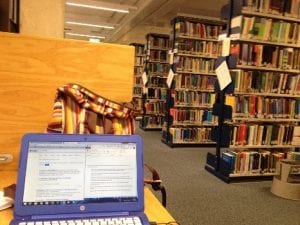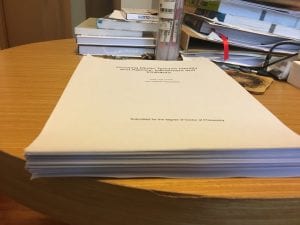My Online PhD Journey – Growing My Own Identity
By Nazlin Bhimani, on 17 August 2018
In the second of these posts on the PhD journey, Dr. Chua who recently passed her viva, writes about her experience of the Online PhD at the Institute of Education, London.
I am grateful for the day I found out that the PhD was being offered online at the IOE. Doing the PhD online allowed me to be with my family and colleagues in Singapore. The PhD has changed my life and in the post below, I am going to tell you about my journey on the online programme.

My desk at home where I worked on my PhD
I remember the first time I logged into Moodle in 2015 and watched Richard Freeman, programme leader of the online PhD, introduce himself in a video. He was seated in his office and he showed us a view from his window. I do not remember the view, but I immediately had a sense of place even though I was not physically in UCL IOE – it was bizarre! I also vaguely remember one of his first posts – something about different ways of tying shoelaces. It must be an analogy for research methods as henceforth, the world of research methods opened up through Richard’s various creative, and often intriguing assignments. One of the assignments I remembered vividly was about transcribing an interview with the late Princess Diana from YouTube. It was bewildering the number of varied ways in which we produced the transcript and the discussions we had online making me realise that what had initially seemed a mundane reproduction of information, had evolved into an understanding of different subjective human experiences! It made me appreciate how research is part of our lives, and an extension of what we do to help us become who we will become.
Then, the course on information and literature searching presented a huge light-bulb moment in my research journey. This was when I met Nazlin Bhimani who gave much care through her detailed comments and feedback on our tasks. She didn’t just point us to information, but she developed our research technique. We got started on mindmapping our literature review and trialling a great variety of tools, databases and software that could help us organise our data. It got me started on organising and evaluating my literature review, and I began to set up an e-filing system for my literature and my notes. This headstart in establishing an information management system was critical as I was able to readily search and retrieve articles and notes each time I needed to revise my writing. I continue to use the same system for my other research work.
My only regret is that I have not been able get to know other staff and students at CCM as I have little contact with them, apart from my supervisor Graham Welch. Graham was an excellent mentor, who always got back to me quickly with comments that more often than not, stretched my thinking. The routine of drafting and then meeting on skype helped to pace my work. I also had the opportunity to learn about the research work of some of the faculty, including Grahams’ various national-level education projects, and the transformative research on throat cancer patients by my upgrade examiner Evangelos Himonides. During my doctoral studies, Graham made me reflect on my motivations for my research and continually prompted me on what I hoped to achieve for society. I was constantly reminded of how research must serve the greater good, and researchers have a role to play in making this world a better place.
Here are some shifts in thinking I have as a researcher.

My first and only visit to the physical library
First, for information gathering. I was and am still amazed by how much research and information gathering could be done without being in a library! In fact, I have only visited the physical IOE library once in the first year of my online MPhil/PhD. The IOE Library’s digital collections have grown beyond the physical library. The extensive support was invaluable for me as a long-distance learner, for they increased the efficiency of my work manyfold. The online library guides were my constant companions during the writing process, particularly the A-Z referencing with APA guide.
Second, research is not just a personal endeavour to interpret information and uncover knowledge. The whole process is pretty much a social learning experience. To a large extent, the writing developed when there were insights inspired through interactions with others. Lacking the face-to-face interactions meant paying more attention to fellow students’ work on Moodle and giving more thought to my own posts since these were communicated in writing rather than verbally. Most insights were inspired through my work with colleagues, and in return, my research brought forth new understandings.
Third, our research work may impact others in ways that we might never know. I am sometimes surprised when I hear random remarks that mention a finding from my work in different contexts. Hence, researchers have a social responsibility. And we must believe that research can make this world a better place (or not). I have been inspired again and again by the impact of research at IOE reported in the media.

My thesis for binding and submission for viva
So, now that I have been awarded the PhD, looking back, the online PhD journey has been an incredible experience. My research was on growing music teacher identity. But I feel that this journey has been transformative to my own identity. For this reason, I am intensely grateful to the tutors at IOE who have made the doctorate possible for distant learners like me.
I wish so much for continued access to the amazing electronic resources in the library which has been my close buddy for the past 3.5 years in my PhD journey. It isn’t just a repository of information, but it has become a friend whom I would greet first every time I went online for anything related to research. As I speak, I know our dedicated tutors are working to continue to support students with these resources post-PhD. See https://www.timeshighereducation.com/news/doctoral-graduates-need-five-years-post-phd-career-support.
This blog is dedicated to Graham Welch, Richard Freeman, Nazlin Bhimani, Evangelos Himonides, David Baker, Jo Saunders, Lucy Green, Gary Ford, Hazel Croft and all who have made a positive impact on my online PhD experience, and inspired me to be a better researcher, a better person.
Siew Ling Chua
2 Responses to “My Online PhD Journey – Growing My Own Identity”
- 1
-
2
Yassin Hassan wrote on 2 October 2020:
That is so great!. I am pleased that you reached your destination of obtaining your PhD. Thanks for sharing your journey with us. It inspires me and gives me great motivation.
Thanks,
Yassin
 Close
Close


Hello – I just wanted to add a comment to say that your blog is great and also very profound. I am thinking about doing a Ph.D when I have finished my master’s degree at the IoE and reading your blog makes me want to really go for it! The IoE is a wonderful institution. I had not known that they offered an online Ph.D.